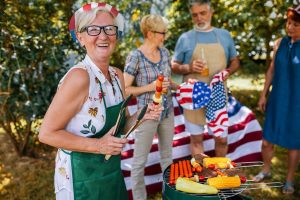How to Select the Right Senior Living Community
After you or a family member has made the important decision to downsize and move to a senior living community, it’s time to start researching all your options. Whether you’re looking for a community that offers independent living in a private home or you need an option that provides help with daily living activities, knowing what questions to ask can help you through this transitional time. Below are five questions you might consider asking while touring senior living communities.
5 Questions to Ask When Selecting a Senior Living Community
1. What level of care is provided?
A senior living community may be in an ideal location, just 10 minutes away from your grandchildren and a short drive from your doctor’s office. However, if that community does not provide the support you need, it is not a good fit. That is why you should always ask about the level of care provided when touring a community.
There are many different kinds of senior living communities, each of which is suited to meet very different needs. Assisted living communities, for instance, provide support to individuals who need assistance with activities of daily living like eating or bathing. An independent living community, on the other hand, is better suited to someone who needs little-to-no assistance.
Keep reading to learn more about the care provided at different communities.
Independent Living Communities
An independent living community offers maintenance-free living with a variety of services and amenities like scheduled transportation, daily dining options, home maintenance and weekly housekeeping, and social activities. These communities are designed for adults aged 55 and older.
Assisted Living Communities
If you are no longer able to live independently, an assisted living community offers additional care. While you will still enjoy a wide array of services and amenities like that of an independent living community, you will also receive assistance with daily living activities like dressing, bathing, grooming, mobility, eating and more.
Skilled Nursing Communities
Skilled nursing communities provide around-the-clock nursing services for those who need a higher level of medical care. These communities include short- or long-term rehabilitation services to help residents regain their independence.
Memory Care
Many assisted living communities or skilled nursing communities have a special wing that offers personalized memory care. These wings provide programming and medical staff designed to enhance the lives of those with cognitive decline related to dementia.
Continuing Care Retirement Communities (CCRC) or Life Plan Communities
Life plan communities are the most comprehensive type of senior housing. These communities provide a full spectrum of senior health services. If you move into an independent living apartment, for instance, but later find that you need more support, you will have priority access to services like assisted living and memory care.
2. What services are offered?
Senior living communities afford a maintenance-free lifestyle. That means the staff does the heavy lifting, handling yard maintenance, housekeeping, laundry, cooking, transportation and more. Without the hassle of day-to-day chores, residents are free to explore hobbies and meet new friends. When selecting a community, be sure to explore which services are available. Most communities offer:
- Dining: most, if not all, communities offer meals prepared by in-house chefs. Look for a community that has plenty of nutritious and enticing meal options. You might even consider sampling the food before making your final decision.
- Housekeeping: cleaning gets tedious. Fortunately, the right senior living community will provide housekeeping services. Staff will typically handle dusting, vacuuming, mopping and laundry.
- Medication management: it can be tough to keep track of medications, but the right team will help keep you on schedule. Depending on the community, staff will help you with your medication regimen, so you never miss a dose.
- Wellness programs: staying healthy involves more than just caring for your physical needs. You have to stay committed to your emotional, spiritual and social health if you want to enhance your lifestyle. The best senior living communities will offer a holistic wellness philosophy that encourages you to thrive.
3. What’s included in the monthly charge?
Before moving into a senior living community, it is important to determine what the monthly charge includes. Some rental fees encompass all utilities, services and amenities while others offer a more customizable fee schedule. If you need medication management, for instance, that service can be added to your bill. Generally speaking, however, most community fees cover:
- Electric
- Water and sewer
- Maintenance and repair
- Garbage removal
- Wi-Fi
- Basic cable television
Communities also offer certain amenities at no additional charge. Here are some examples of the amenities you might enjoy:
- Fitness center
- Beauty salon and barbershop
- Spa
- Dog park
- Theater
- Courtyards, patios and balconies
4. What efforts are made to help keep residents safe?
You may want to look for a community with a security team. Many communities are staffed with security guards who patrol the premises 24 hours a day, either by foot or by vehicle. These additional measures provide immense peace of mind.
5. What opportunities are available to help residents remain active and engaged?
The best senior living communities focus on enhancing residents’ quality of life by providing opportunities to stay active and engaged. Many communities do this by offering a variety of different activities to choose from. For instance, the fitness center may host a walking or jogging club that meets to explore the community’s walking paths. There could also be regular social events like music recitals, lectures and outings.
Along with an activity schedule, the community should offer ways for families to get involved. Family and friends may be invited to join support groups and attend educational seminars. Encouraging family support is crucial to ensuring residents don’t feel isolated.
Choosing the Right Senior Living Community
With so many different senior housing options available today, it’s easy to become confused about what type of retirement home will be best for your individual needs. In addition to knowing the different senior housing types and the level of care available at each, taking notes during an in-person or virtual visit can help. By asking questions, exploring the amenities, talking to staff and residents and sitting down for a meal, you can get a better feel for the location and whether it’s the best fit for you or your family member.


